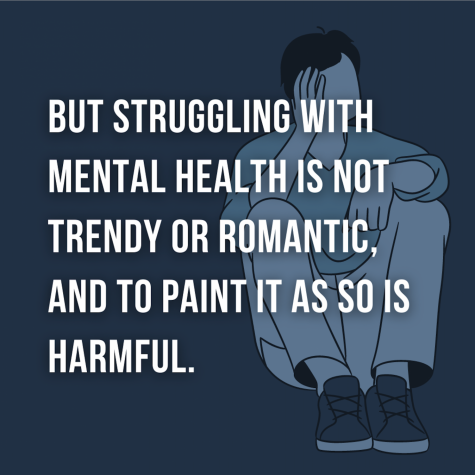“Dear Evan Hansen” is an amazingly nuanced portrayal of mental health issues
Examining the strong and weak depictions of social emotional challenge representation in media
October 30, 2021
ince people are so quick to turn to the Internet for answers, it’s easy to compare our personal struggles to what we’re shown through popular media. In the past, individuals with mental illness were often depicted as unstable and dangerous. A prime example of this is the 2019 movie “Joker,” which featured a protagonist slowly succumbing to his mental illness and turning to extreme violence. Despite being cinematically interesting, these depictions reduce those with mental illness to something inhuman; their entire identity is defined by their struggles.
But one could argue that we’ve come a long way as people are becoming more knowledgeable and accepting when it comes to mental health challenges, according to the American Psychological Association. But with this acceptance comes a new problem: the romanticization of mental illness, or idea that coping with mental health struggles is something to be desired. For example, in the Netflix series “13 Reasons Why,” the death by suicide of the main character is turned into a revenge story, where she sends 13 letters to 13 people detailing how they contributed to her suicide. The show disregards the numerous factors that could contribute to suicide, such as fear of loss or failure, feelings of hopelessness or worthlessness, or isolation, (and the fact that malicious reasons like revenge are rarely on the list), reducing everything to “if everyone just acted morally, everything would have been fine.” Mental struggles are used as a tool, something that someone can use for their own gain to manipulate others and seem special or noticed.

But struggling with mental health is not trendy or romantic, and to paint it as so is harmful. These depictions downplay the severity of mental illnesses and portray suicide so that they look like a dramatic act rather than something that could’ve been prevented. It’s harder to take mental health seriously when we see such unrealistic depictions like the ones in “13 Reasons Why” or “Joker,” because in contrast to the performances we know are probably exaggerated and far-fetched, it seems logical that in reality they aren’t so weighty. Especially in high school communities like MVHS, it’s especially easy to perpetuate this mindset. Everything boils down to, “I can’t stand not erasing the whiteboard. OCD, man!” or “I want to die — this test is so hard.” And perhaps these flippant comments don’t seem like a big deal. After all, these phrases are never said with malicious intent, nor are they meant to be true. So what? They’re just jokes, right?
But when everyone is supposedly depressed or anxious, it’s harder to notice those who are actually suffering from these illnesses. Joking about mental health creates a sort of self-stigma — the idea that “it’s not a big deal, everyone feels like that.” This dismissal pushes people to avoid seeking help altogether, perpetuating the stigmatization of mental health treatment and causing them to not want to look like the odd one out. In fact, according to the National Institute of Mental Health, despite a growing number of people with mental illnesses, less than 50% of adults with mental illnesses and less than 40% of young adults with mental illnesses are receiving treatment. Dismissing these mental illnesses as commonplace through jokes can, ironically enough, make those who are actually struggling to feel delusional.
Mental illness and health exist on a spectrum, making it impossible to represent every possible experience, but a good starting point is the musical “Dear Evan Hansen.”

The musical’s protagonist, Evan Hansen, writes letters to himself as an assignment from his therapist, which reveal that he feels invisible to the world. His single mother is absent due to working long hours, he has no friends and can’t bring himself to socialize. To top it all off, he can’t help but feel as if no one would notice if he just disappeared. To summarize the plot in simpler terms than it deserves, a misunderstanding occurs when school delinquent Connor Murphy is found with one of Evan’s letters after dying by suicide, and Evan decides it to be easier to go along with the idea that he and Connor were friends. Throughout the musical, Evan creates a grand narrative of his supposed friendship with the help of his only friend Jared and classmate Alana, creating projects in Connor’s name and going viral, only to have it all crash down when his lies are revealed. In the end, he realizes that the feeling of belonging he wanted existed all along in his mother, who remained by his side no matter what. Evan resolves to stop pretending and instead accept himself and embrace his anxiety.
The musical takes on an absurd premise with endless potential for disaster, yet it achieves what so many other stories failed to do before. What sets “Dear Evan Hansen” apart is that it acknowledges complexity. Evan is not a totally good person, which is made clear when he takes advantage of another student’s suicide. He is imperfect, as are Connor and Evan’s friend. So is every other character in the musical. They’re not hiding a redeemable quality, their flaws aren’t made up for in something else. No one is ever working out of the kindness of their heart — and that’s fine. Evan and the rest of the characters aren’t meant for the audience to love, but rather to show them that those with mental illness, like Evan, aren’t necessarily a positive influence. The musical takes his anxiety seriously, showing the negative impact it has on Evan’s life. Yet it also holds Evan accountable for his unforgivable actions, rather than using his anxiety as a scapegoat and the only reason why any of this happened, in the way movies like “Joker” do. His actions are all done of his own volition, not because his anxiety made it impossible for him to tell the truth before things got too far. Evan rightfully loses everything that he built, ending up back at square one, as normal and unknown he was in the beginning.
But at the same time, the musical constantly reminds the audience that Evan is still human, and not even his anxiety can change that. Although his mental struggles are the catalyst for the story, they don’t overpower his character. Instead, Evan is motivated by a desperation to be noticed and to matter to the world — a feeling that is universal. He is realistic, not just to those who struggle with mental illness, but also to those who don’t, serving as a reminder that everyone has the desire to belong.
Struggles with mental health aren’t something that should be spun as desirable or useful. They aren’t something that will disappear overnight through some beautiful life-changing journey. They shouldn’t be reduced into the sole defining quality that ruins people’s lives. Instead, they should be depicted as a key part of an individual’s life, something that coexists with the push and pull of everyday life. Because to those struggling with mental health, what matters, as Evan Hansen would say, is that “today at least you’re you …
… and that’s enough.”
















